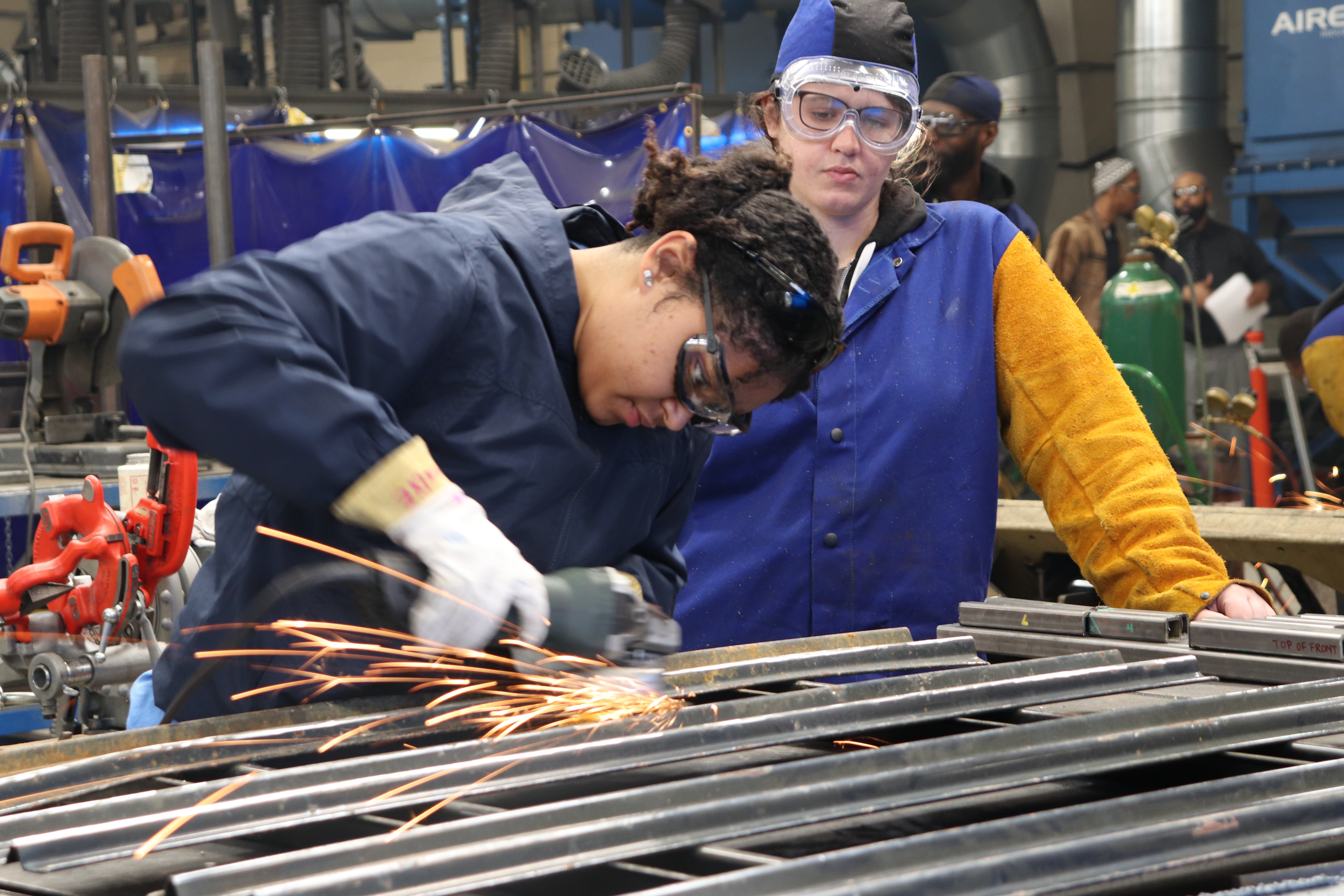Trade Apprenticeships cover a wide range of opportunities within a multitude of industry sectors. Trades are commonly physical and skilled jobs such as plumbing, electricians or bricklaying. Trade apprenticeships are also mostly associated with the construction industry as most of the on-site (building site) workers are trades people.
The term “Trades People” has been around for many years and refers to “a person who is able to carry out a specific or specialist trade” such as a bricklayer or a plumber.
By starting as a trade apprenticeship you will gain valuable experience whilst learning on the job from seasoned professionals looking to transfer their knowledge and skills to the next generation of trades people looking to develop their careers.
If you have any questions about how to become a trades apprentice please feel free to drop us a line: Contact Us
Learn a new skill and start to build the foundations of your career with a trade apprenticeship.
By starting a trade apprenticeship you are one step closer to carving out a successful career. Many industries are crying out for staff at the moment due to the “Skills Gap” however the need for specialist trades is increasing day by day and Brexit hasn’t helped the situation.
If you are considering trade apprenticeships the opportunity across sectors such as Utilities, Telecommunications, House Building to mention a few is immense. Starting “on the tools” as it is referred to in the industry allows you to understand just exactly how your chosen trade is done. You can then progress your career to a Foreman or Site Manager and then even become a Project Manager.
Some entrepreneurial trades persons even start their own plumbing or construction businesses, employing staff and apprentices to pass on their knowledge and skills. Some of the UK’s largest companies started from a single person.

Trade Apprenticeships vary and more importantly the skill and knowledge you want to learn, however the main trades are:
Plumbing Apprenticeships
Plastering Apprenticeships
Bricklaying Apprenticeships
Electrician Apprenticeships
Note: To find out further information about the apprenticeships on offer and the qualifying criteria, plus the qualifications you can gain please visit our apprenticeships guide for each of the above trades.
Who doesn’t offer trade apprenticeships? Before you start to applying for apprenticeships it would be best to first consider which industry you want to work in from House Building to Utilities or the commercial construction industry.
Once you have decided this then pretty much any companies within those industries offer apprenticeships, please see below a selection of industries and associated companies offering trade apprenticeships.
House Building
House building is one of the UK's largest industries made up of hundreds of house builders across the country from SME's to large FTSE companies. On average there are 240 - 250 thousand houses built each year meaning there is plenty of opportunity to kickstart your career.
House builders offering Trade Apprenticeships include:
• Taylor Wimpey
• Barratt Developments
• Persimmon Homes
• Bovis
• Bellway
• Berkley Group
Utilities
The utilities sector covers Gas, Water, Electricity and Telecommunications. You can start a trade apprenticeship with many of the sub-contract services companies who provide engineering and construction services to the utility sector.
You can find out more about the industry and apprenticeships plus how to apply for an apprenticeship in utilities on our dedicated Utility Apprenticeships page.
Transportation
Transportation covers many areas from the infrastructure we use including Railways to Motorways and there are thousands of companies providing services to the infrastructure owners and operators such as Network Rail or Transport for London.
Companies of Trade Apprenticeships in the Transport sector include:
• Milestone Infrastructure
• Transport for London
• Kier Highways
• Volker Highways
• Murphy Group
Commercial Construction
Commercial construction relates to office, industrial and retail, basically anything which isn't residential. There are also services which are provided to the commercial industry through facilities management companies which may fall into the commercial construction sector. Although most trades will be similar if not the same there are sometimes different regulations and procedures within the commercial sector.
Commercial construction companies offering trade apprenticeships include:
• Balfour Beatty
• Kier Group
• Galliford Try
• Interserve
• Lang O'Rourke
Each trade offers it own qualifications from an NVQ to a HND or even degrees such as Bachelors or Masters.
However most trades don’t require you to have degrees but you will be required to have completed formal training either privately through a training company or a college to attain your NVQ or HND for instance.
You do not have to do a trade apprenticeship to receive these qualifications, however other routes do not offer paid on the job training, but will require you to attain some form of work experience for the practical side of your training. Trade Apprenticeships enable you to get paid a salary and receive on the job training and study leave to college or an apprenticeship training provide for the academic qualifications.
Degree apprenticeships in these fields are more commonly associated with higher level positions within the industries such as Structural Engineers, Electrical Engineers or Quantity Surveyors. You can develop your career from being a trades person to a specialist in the field through the apprenticeship route.

Intermediate Apprenticeships are your entry level into the world of apprenticeships more commonly known as a Level 2 Apprenticeship. Level 2 apprenticeships offer an excellent route into further education post 16, as an alternative to staying on at school, whilst receiving on the job training and studying towards a nationally recognised qualification.
During your intermediate apprenticeship you will study part-time with a college or a training provider, 20% of your training, towards an NVQ Level 2 and knowledge based qualification such as a BTEC, together these qualifications are the equivalent to 5 GCSE's grades 9 - 4 (A* - C on the old grading system). You will also receive a Level 2 Functional Skills in Maths and English if you don't already have them.
An Intermediate Apprenticeship is great for learning work related skills as apposed to being given more responsibility. This level of training will make you work ready and train you in the hands on skills required to undertake the responsibility of the task and give you the employability skills you need to be successful.
Qualifying Criteria
There is no formal qualifying criteria for a Level 2 Intermediate Apprenticeship however some employers may ask for a minimum of 2 GCSE's to be able to join their apprenticeship programme.

Advanced Apprenticeships or commonly known as Level 3 Apprenticeships are the equivalent to doing 2 A-Levels and are the next level from an intermediate apprenticeship. Level 3 apprenticeships are great for you to start once you have completed your GCSE's and have attained the correct grades to be able to start at this level.
Starting at the advanced level even if you already have A-levels enables you to gain on the training, of which some employers prefer you to have before starting a Higher or Degree apprenticeship.
Just like an intermediate apprenticeship you will be required to spend at least 20% of your time studying with a college or training provider to be able to achieve the qualifications. On completion of you r apprenticeship you will achieve the equivalent of 2 A-Levels in the form of an NVQ Level 3 and a knowledge based qualifications such as a BTEC diploma.
Qualifying Criteria
To qualifying for a Level 3 advanced apprenticeship many employers ask for a minimum of 5 GCSE's which must include Maths and English, this is why an intermediate apprenticeships gives you these qualifications on completion. Although an advanced apprenticeships is the equivalent of 2 A-Levels some employers may add A-Levels as their requirement at this level also.
Find companies advertising advanced apprenticeship jobs on our website.

Higher Apprenticeships are your Levels 4 and 5 qualifications and enable you to study towards a HNC or HND respectively whilst at Level 5 you can also attain a foundation degree which is great if you want to continue in your studies towards a bachelors degree.
During your higher apprenticeship training you will be required to studying part-time with a training provider, college or university which along with your on the job training will enable you to train towards a Level 4 or 5 NVQ and BTEC diploma along with their respective HNC or HND qualification. Higher apprenticeships can take up to four years to complete.
As a higher apprentice you will be given a lot more responsibility which may include managing people or teams or even responsible for managing projects. You will be supported by your employer along side your mentors and tutors making sure to advise and guide you along the way during your apprenticeship programme.
Qualifying Criteria
To qualifying for a higher apprenticeship you will need to have achieved and completed at least a Level 3 Apprenticeship or have 5 GCSE's grades 9-4 which must include Maths and English and 2 A-Levels.
Find companies advertising higher apprenticeship jobs on our website.

Degree apprenticeships were introduced in September 2015 and have been receive with open arms both by employers and apprentices alike. Also known as Level 6 or 7 apprenticeships the degree level apprenticeship enables you to study towards a Bachelors or Masters degree.
You can start a degree apprenticeships straight after your advanced apprenticeship level or alternatively if you want to gain more on the job training before the Level 6 programme you can overlap from a higher apprenticeship programme. Many employers are now partnering with leading universities across the country to offer degree level apprenticeships to help advance your learning opportunities.
Just like studying at university a degree level apprenticeship takes between 3 to 6 years to complete you will achieve this by on the job training with your employer and training provider and then part-time study at the designated university for your apprenticeship course.
Qualifying Criteria
To qualifying for a degree apprenticeship you will need to have at least Level 3 qualifications of 2 A-Levels, NVQ and BTEC or have completely the advanced apprenticeship. Level 6 and 7 are also a natural progression from a higher apprenticeship.
Find companies advertising degree apprenticeship jobs on our website.
FAQs about Bricklaying Apprenticeships
Where can I find a trade apprenticeship?
Use our quick and easy search function to find a trade apprentice or register to become an apprentice and set up email alerts to have trade apprenticeships sent directly to you.
Do I have to have previous experience in a trade?
The short answer is no. Many trades offer entry point apprenticeships so you can learn from the ground up or on the tools as it is phrased.
How much can I earn once I have completed my trade apprenticeship?
Trades are in demand and once you are qualified and have a number of hours on the job under your belt you could anywhere between £200 - £300 per day or in a recent article from Pimlico Plumbers they have plumbers earning up to £200k per year.
Will I have to work outside to do a trade apprenticeship?
Only a select few trades require you to work out side, such as bricklayers or roofers. Must trades specialists tend to work inside such as electricians , carpenters or plumbers.
Which companies recruit trade apprentices?
There are thousands of companies up and down the country looking to recruit apprentices in all trades from bricklayers to electrician. you can start an apprenticeship in related industries such as construction apprenticeships and telecom apprenticeships.
What is an apprenticeship?
An apprenticeship is a form of further education which offers on the job training for you to gain a nationally recognised qualification whilst studying part-time with an apprenticeship training provider, college or university through workshops or classroom training.
Apprenticeship training has to be delivered by a registered apprenticeship training provider which can also be an employer-provider, where the employer you are training through are on the register of training providers to be able to deliver their own training requirements. If an employer acts as an employer-provider they will usually employ a number of people such as Apprenticeship Assessors, Mentors and Managers to support you through your apprenticeship programme.
During your apprenticeship you will receive a salary and all the other benefits permanent employees receive. An apprenticeship job is only for a specified time as stipulated at the beginning of your apprenticeship training which can last anything from 12 months to 5 years.
To find our more about apprenticeships please refer to our What is an Apprenticeship? guide.
Why should you start an apprenticeship?
If you are considering your post 16 options you probably wouldn't have considered an apprenticeship a few years ago and would be struggling or worrying what to do when you leave school. It is a legal requirement for you to now stay in some form of further education until the age of 18 and you now have three options A-Levels, College or an Apprenticeship.
You can start an apprenticeship at the age of 16 through the Intermediate or Advanced level apprenticeship programmes across many industry sectors from Construction, Technology or even Marketing. There are no entry requirements for the intermediate apprenticeship, however you will need at least 5 GCSE's at grade 4 (previously C grade) or above to qualify for the advanced apprenticeship. On completion of the intermediate you will gain the qualifying criteria for a level 3.
The best reason for starting an apprenticeship is on completion of each level you will receive a nationally recognised qualification from an NVQ all the way up to a degree level apprenticeship such as a Bachelors or Masters.
How can you become an apprentice?
There are a number of ways to become an apprentice so we thought we would list them for you:
- Register with websites like ourselves, there are others available.
- Apprenticeship Job Fairs are great for meeting employers and training providers.
- Contact training providers in your area, a simple Google search "Training providers near me" will give you the information you need.
- Contact your local colleges or universities or visit their websites to see if they offer apprenticeship training.
- UCAS promote apprenticeship opportunities on their website on behalf of employers.
and finally......
- Do some research on apprenticeships and find a topic or industry that you would like to start an apprenticeship in and then research local companies in those sectors and visit their websites to see if they offer apprenticeship training and apply directly with them.
Trade Apprenticeships
FAQs about Trade Apprenticeships